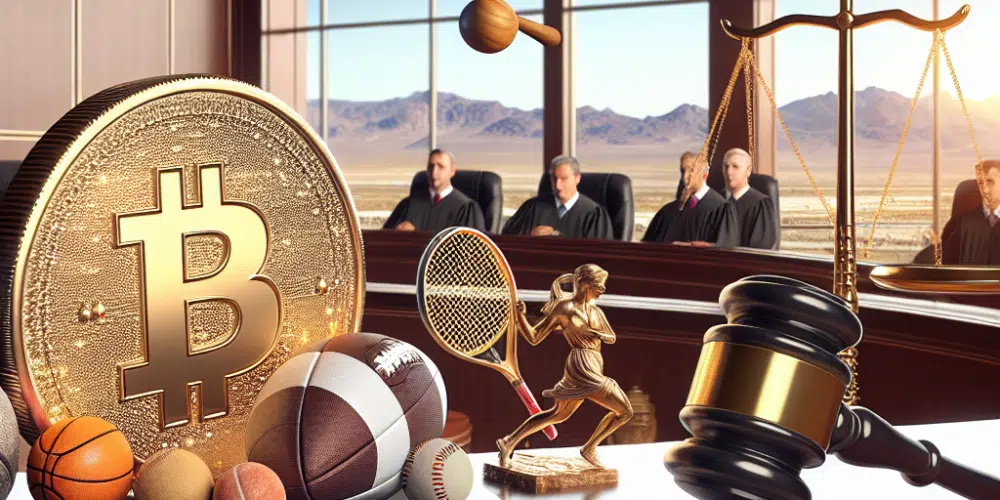Federal Nevada judge Andrew Gordon has recently denied Crypto.com’s request for an injunction that would have allowed the company to continue offering sports event contracts in the state. This ruling comes as a surprise to many observers, especially since Judge Gordon had previously granted a similar injunction to prediction market firm Kalshi earlier this year.
In the lawsuit filed in June, Crypto.com contested the Nevada Gaming Control Board’s order to cease offering contracts based on the outcomes of sporting events. The company argued that these contracts should be classified as “swaps” and thus fall under the jurisdiction of the Commodity Futures Trading Commission (CFTC), not state gaming regulators. By positioning these contracts under the federal oversight of the CFTC, Crypto.com aimed to distinguish them from traditional gambling products.
Earlier this year, in April, Kalshi successfully made a similar argument, with Judge Gordon agreeing that the CFTC had “exclusive jurisdiction” according to the Commodity Exchange Act. This decision allowed Kalshi to continue operating while larger legal debates ensued. However, in this instance, Judge Gordon chose not to extend the same judicial protection to Crypto.com. The detailed reasoning behind this decision has not been made public yet, but it could hinge on how the court interprets the definition of a “swap.”
According to federal law, a swap must be tied to a financial or economic outcome. The question of whether a sporting event’s outcome meets this criterion has been a contentious issue among regulators and prediction markets for several years. If the court determined that Crypto.com’s contracts don’t satisfy the definition of a swap, this could justify the denial of their request. Earlier this week, the CFTC issued a letter to companies offering sports event contracts, stating it has not yet reached a verdict on their legality. This ongoing uncertainty may have influenced the judge’s decision to refrain from issuing another injunction.
Industry experts have noted the potential ramifications of this decision. Daniel Wallach, a legal analyst, pointed out that if sports event contracts are not recognized as swaps under the Commodity Exchange Act, it could dismantle the entire business model for such contracts. The ruling thus has significant implications for the future of these financial instruments in the sports industry.
Despite the setback, Crypto.com plans to appeal the decision to the Ninth Circuit Court of Appeals. The company heavily referenced the Kalshi case in its arguments, mentioning it 38 times, and urged the court to apply similar reasoning. A spokesperson for Crypto.com expressed confidence in the appellate process, suggesting that when similar cases receive different rulings from the same judge, an appeal might produce a different outcome.
Kalshi, on the other hand, currently retains its injunction in Nevada, which allows it to continue operating under the protection of the previous ruling. However, the company faced a contrasting outcome in Maryland, where a judge ruled that federal commodities law does not supersede state gambling regulations, underscoring the complex legal landscape these companies navigate.
The differing judgments in Nevada and Maryland highlight the ongoing jurisdictional battle between federal and state authorities over what constitutes legally permissible contracts in the context of sports events. While federal law aims to provide a uniform framework, state laws still play a crucial role in determining what is classified as gambling. This dichotomy creates a challenging environment for companies like Crypto.com and Kalshi, which operate at the intersection of finance and entertainment.
As the appeal process unfolds, market participants and regulators alike will be closely monitoring for any shifts in legal interpretations that could redefine the regulatory landscape for sports event contracts. The outcome of Crypto.com’s appeal could set a precedent that either reinforces federal oversight or strengthens state authority in regulating these contracts.
In the meantime, the uncertainty surrounding the legal status of sports event contracts continues to pose challenges for companies seeking to innovate within this space. The industry must navigate a complex web of regulations, balancing the need for compliance with a desire to provide innovative products to consumers. The ultimate resolution of these legal challenges will likely shape the future trajectory of sports event contracting, influencing how companies structure their offerings and engage with regulatory bodies.

David Garato is a luminary in gaming journalism, renowned for peeling back the curtain on the gaming world with his witty and insightful commentary. A decade into weaving stories from the pixelated edges of indie games to the expansive universes of AAA titles, David’s work is a thrilling blend of analysis and adventure. When not writing, he’s live-streaming, sharing his gaming exploits with an engaged and growing audience. David doesn’t just write about games; he lives them, making him a trusted guide in the gaming community.
















